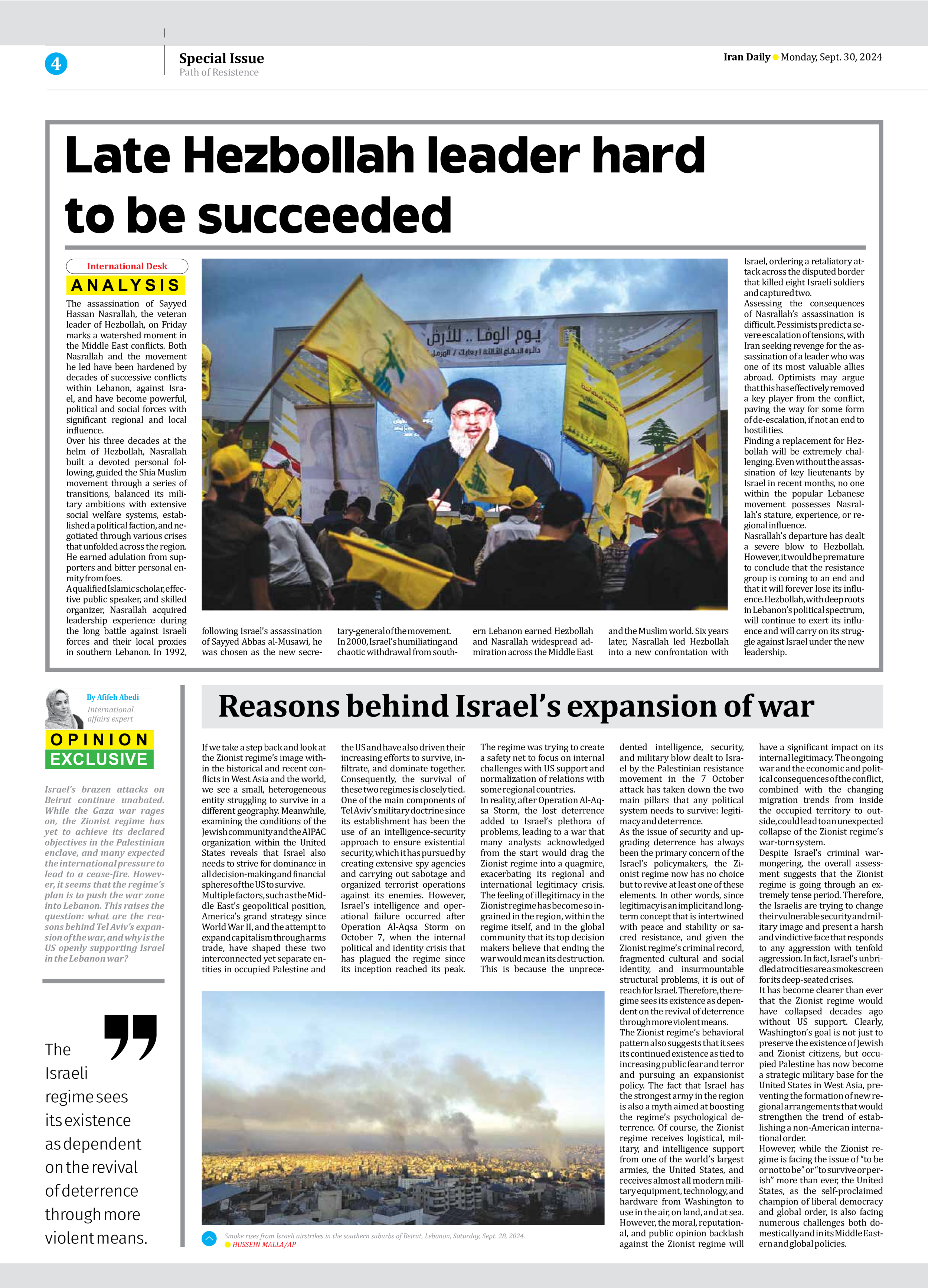
Reasons behind Israel’s expansion of war
Israel’s brazen attacks on Beirut continue unabated. While the Gaza war rages on, the Zionist regime has yet to achieve its declared objectives in the Palestinian enclave, and many expected the international pressure to lead to a cease-fire. However, it seems that the regime’s plan is to push the war zone into Lebanon. This raises the question: what are the reasons behind Tel Aviv’s expansion of the war, and why is the US openly supporting Israel in the Lebanon war?
By Afifeh Abedi
International affairs expert
If we take a step back and look at the Zionist regime’s image within the historical and recent conflicts in West Asia and the world, we see a small, heterogeneous entity struggling to survive in a different geography. Meanwhile, examining the conditions of the Jewish community and the AIPAC organization within the United States reveals that Israel also needs to strive for dominance in all decision-making and financial spheres of the US to survive.
Multiple factors, such as the Middle East’s geopolitical position, America’s grand strategy since World War II, and the attempt to expand capitalism through arms trade, have shaped these two interconnected yet separate entities in occupied Palestine and the US and have also driven their increasing efforts to survive, infiltrate, and dominate together. Consequently, the survival of these two regimes is closely tied.
One of the main components of Tel Aviv’s military doctrine since its establishment has been the use of an intelligence-security approach to ensure existential security, which it has pursued by creating extensive spy agencies and carrying out sabotage and organized terrorist operations against its enemies. However, Israel’s intelligence and operational failure occurred after Operation Al-Aqsa Storm on October 7, when the internal political and identity crisis that has plagued the regime since its inception reached its peak. The regime was trying to create a safety net to focus on internal challenges with US support and normalization of relations with some regional countries.
In reality, after Operation Al-Aqsa Storm, the lost deterrence added to Israel’s plethora of problems, leading to a war that many analysts acknowledged from the start would drag the Zionist regime into a quagmire, exacerbating its regional and international legitimacy crisis. The feeling of illegitimacy in the Zionist regime has become so ingrained in the region, within the regime itself, and in the global community that its top decision makers believe that ending the war would mean its destruction. This is because the unprecedented intelligence, security, and military blow dealt to Israel by the Palestinian resistance movement in the 7 October attack has taken down the two main pillars that any political system needs to survive: legitimacy and deterrence.
As the issue of security and upgrading deterrence has always been the primary concern of the Israel’s policymakers, the Zionist regime now has no choice but to revive at least one of these elements. In other words, since legitimacy is an implicit and long-term concept that is intertwined with peace and stability or sacred resistance, and given the Zionist regime’s criminal record, fragmented cultural and social identity, and insurmountable structural problems, it is out of reach for Israel. Therefore, the regime sees its existence as dependent on the revival of deterrence through more violent means.
The Zionist regime’s behavioral pattern also suggests that it sees its continued existence as tied to increasing public fear and terror and pursuing an expansionist policy. The fact that Israel has the strongest army in the region is also a myth aimed at boosting the regime’s psychological deterrence. Of course, the Zionist regime receives logistical, military, and intelligence support from one of the world’s largest armies, the United States, and receives almost all modern military equipment, technology, and hardware from Washington to use in the air, on land, and at sea. However, the moral, reputational, and public opinion backlash against the Zionist regime will have a significant impact on its internal legitimacy. The ongoing war and the economic and political consequences of the conflict, combined with the changing migration trends from inside the occupied territory to outside, could lead to an unexpected collapse of the Zionist regime’s war-torn system.
Despite Israel’s criminal warmongering, the overall assessment suggests that the Zionist regime is going through an extremely tense period. Therefore, the Israelis are trying to change their vulnerable security and military image and present a harsh and vindictive face that responds to any aggression with tenfold aggression. In fact, Israel’s unbridled atrocities are a smokescreen for its deep-seated crises.
It has become clearer than ever that the Zionist regime would have collapsed decades ago without US support. Clearly, Washington’s goal is not just to preserve the existence of Jewish and Zionist citizens, but occupied Palestine has now become a strategic military base for the United States in West Asia, preventing the formation of new regional arrangements that would strengthen the trend of establishing a non-American international order.
However, while the Zionist regime is facing the issue of “to be or not to be” or “to survive or perish” more than ever, the United States, as the self-proclaimed champion of liberal democracy and global order, is also facing numerous challenges both domestically and in its Middle Eastern and global policies.







